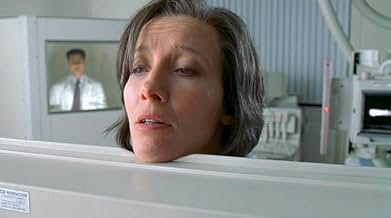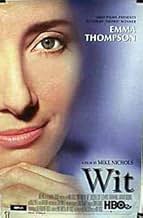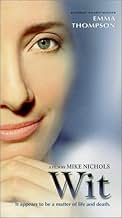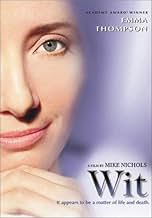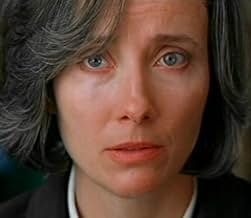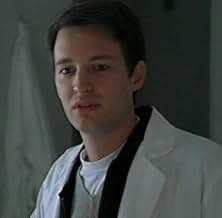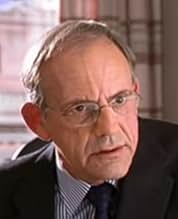A renowned professor is forced to reassess her life when she is diagnosed with terminal ovarian cancer.A renowned professor is forced to reassess her life when she is diagnosed with terminal ovarian cancer.A renowned professor is forced to reassess her life when she is diagnosed with terminal ovarian cancer.
- Director
- Writers
- Stars
- Won 3 Primetime Emmys
- 13 wins & 21 nominations total
- Nurse
- (as Su-Lin Looi)
- Fellow 1
- (as Harry Dillon)
- Director
- Writers
- All cast & crew
- Production, box office & more at IMDbPro
Featured reviews
Emma Thompson puts on a superb performance as Vivian Bearing (a Professor of English Literature specializing in the poetry of John Donne,) who leads us through the last months of her life in narrative style.
Diagnosed with terminal ovarian cancer, Bearing agrees to experimental treatments involving powerful doses of chemotherapy. As we see her gradually losing her fight, Thompson convincingly portrays her emotional and physical torment and pain. Audra McDonald is well cast as the compassionate nurse (Susan) assigned as Bearing's primary care giver, who tries to ensure that, in the face of the doctors' temptation to continue to use Bearing as a guinea pig for their research, she will be treated with dignity and respect in her last days. John Woodward is quite believable as a young cancer researcher (Dr. Jason Posner) who really seems to see dealing with patients as an inconvenience that takes time away from what's really important to him, and his rather emotionless and awkward interplay with Bearing suits the character perfectly; a testimony to Woodward's talent.
This movie offers a powerful commentary on the cold and rather antiseptic environment of hospitals, in which patients are seen more as learning opportunities than people. The poetry of John Donne, interspersed throughout the movie as a source of strength for Bearing, is well used.
There's very little to criticize about this movie. Christopher Lloyd (cast in a rare serious role as Dr. Kelekian, the doctor in charge of Bearing's case) comes across as a bit flat, but the role is a relatively small one, and this doesn't detract much from the story. I also found the flashback scenes to be a bit distracting, but these have to be seen in context: this movie is based on an original stageplay written by Margaret Edson, and these scenes would look quite natural in that environment. I also thought the movie went on about five minutes too long. The last scene to me was unnecessary. I personally would have liked to have seen the movie end with the touching visit by Bearing's former Professor. We'd been put through the ringer enough, and didn't need the troubling last few minutes. These are just minor quibbles, though, about a truly great movie.
It's powerful, well acted, well put together. It could be disturbing to some people uncomfortable with illness and death, but it is an educational experience just to watch. I give it 9/10.
It also comprises a tour-de-force performance by Emma Thompson, an actor whose performances are almost always extraordinary -- so the fact that this one stands out says a lot.
The dialogue (and monologue) is amusing, minimalistic but never too little, and is always sufficient to the scene. There is plenty of irony, wry humor, and understated insight; and yet the film, stark as it is, is abundantly human and, in places, even sweet.
At the height of the grinding sorrow that Thompson so skillfully brings us into, a startling scene between her old academic mentor is a loving act of redemption, shared by them both.
As an additional note, the surprising appearance of Christopher Lloyd in this film, as the research oncologist, provides a perfect foil for Vivian's role as a patient and as an academician. Lloyd's performance is convincing, and yet it contains just enough of eccentricity and kindness to make his character's disinterested role entirely sympathetic.
A wonderful film. Not -- be warned -- an easy film to watch, but decidedly worth it.
I thought that Gorecki's 3rd Symphony in the background was a brilliant touch. Christopher Lloyd as the doctor was excellent. Emma's Teacher reading Runaway Bunny at the end was touching and meaningful. Although some people might see this movie as a downer, it is an honest and important work dealing with life, goals, cancer, relationships, . . See it.
We are given a look into life and death from the point of view of a poetry scholar who has, in turn, viewed life and death in the abstract through John Donne's poetry. She, in turn, is viewed in the abstract by a renowned doctor who views life and death as a case in a bed and by the scholar's former student who doesn't know how to communicate with patients beyond superficial catch phrases.
This is a touching, powerfully filmed play guided by the witty, amusing, profound, and painful asides and soliloquies of the main character. Her only human contact seems to be through the compassionate nurse, the scholar's old teacher, and the audience -- the point being that we too often live our lives inside walled prisons of our own construction and then come to the end realizing that we had never lived at all.
The movie could easily have descended into melodrama but instead is gritty, prim, and gripping in its own odd way. See this one if you can.
Did you know
- TriviaThis movie is often shown at medical colleges as an example of how doctors and researchers should not behave.
- GoofsDuring her exam with the young internist, her arms alternate repeatedly from being completely under the sheet, to being folded together on top of the sheet.
- Quotes
E.M. Ashford: Do you think that the punctuation of the last line of this sonnet is merely an insignificant detail? The sonnet begins with a valiant struggle with Death calling on all the forces of intellect and drama to vanquish the enemy. But it is ultimately about overcoming the seemingly insuperable barriers separating life death and eternal life. In the edition you choose, this profoundly simple meaning is sacrificed to hysterical punctuation.
E.M. Ashford: And Death, Capital D, shall be no more, semi-colon. Death, Capital D comma, thou shalt die, exclamation mark!
E.M. Ashford: If you go in for this sort of thing I suggest you take up Shakespeare.
E.M. Ashford: Gardner's edition of the Holy Sonnets returns to the Westmoreland manuscript of 1610, not for sentimental reasons I assure you, but because Helen Gardner is a scholar.
E.M. Ashford: It reads, "And death shall be no more" comma "death, thou shalt die." Nothing but a breath, a comma separates life from life everlasting.
E.M. Ashford: Very simple, really. With the original punctuation restored Death is no longer something to act out on a stage with exclamation marks. It is a comma. A pause.
E.M. Ashford: In this way, the uncompromising way one learns something from the poem, wouldn't you say? Life, death, soul, God, past present. Not insuperable barriers. Not semi-colons. Just a comma.
- SoundtracksSerenade Adagio
String Quartet #15 (2nd Movement)
Written by Dmitri Shostakovich (as Dimitri Shostakovitch)
Performed by The Manhattan String Quartet
Courtesy of Ess.a.y Recordings
Details
- Runtime1 hour 39 minutes
- Color
- Sound mix
- Aspect ratio
- 1.85 : 1


